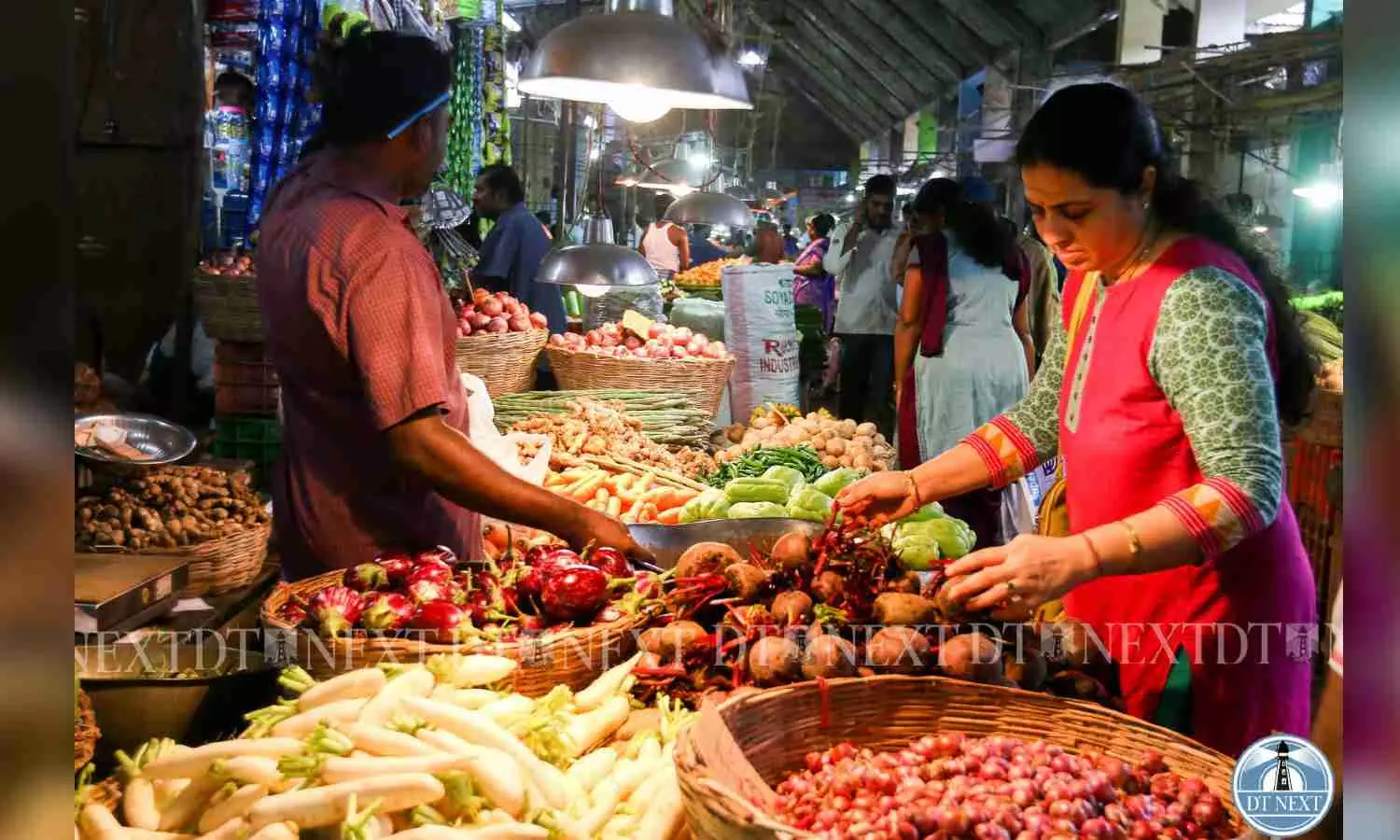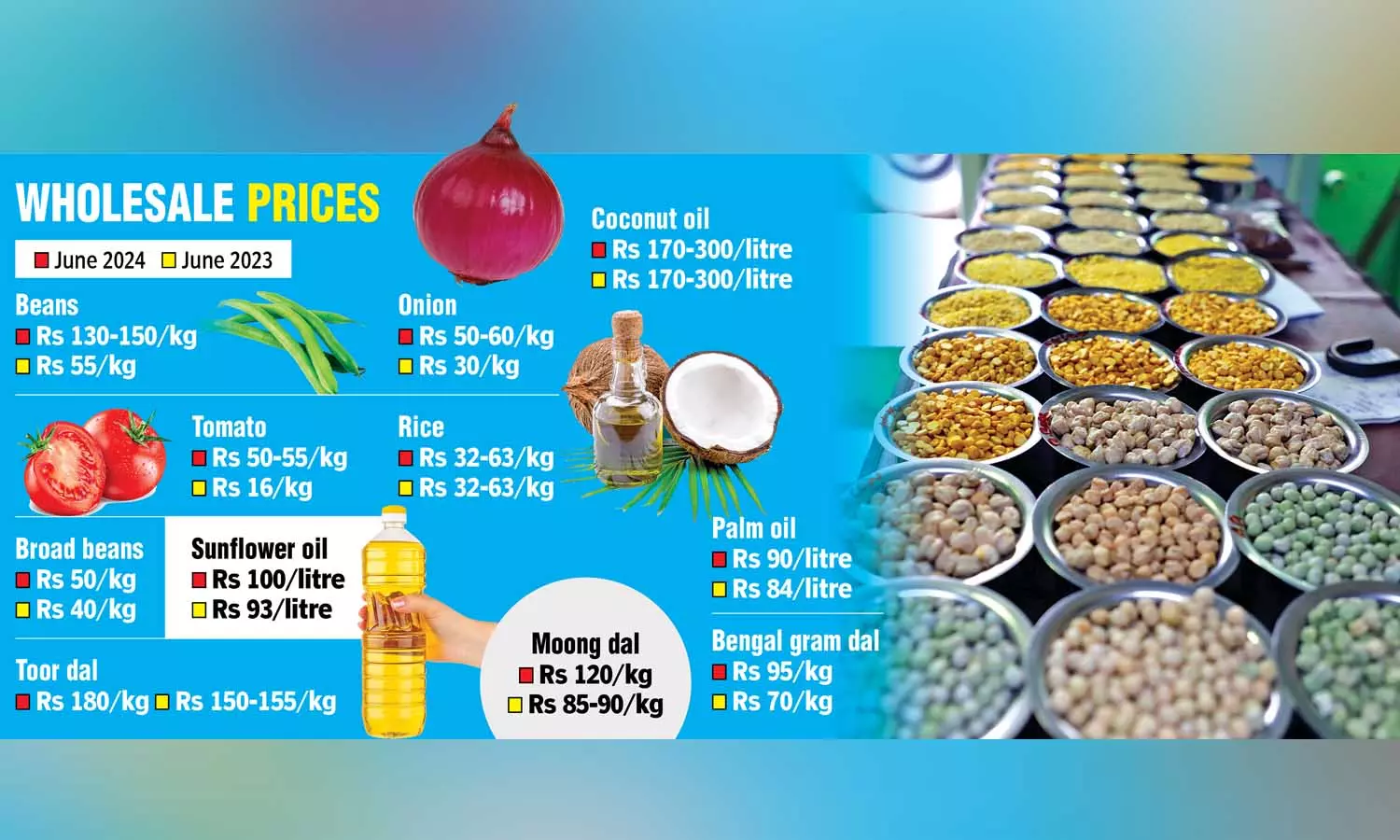
CHENNAI: The phrase ‘living within a budget’ takes on new meanings every few months with prices of essential commodities rising frequently. Hole in the proverbial pocket gets bigger, as inflation makes it a herculean challenge for the middle-class to manage their monthly expenses.
Case in point is the sharp rise in prices of essential commodities in the last few months compared to the previous years.
Experts opined that the inflation rate has increased by 67% in the country, especially prices of food products, which have surged in double digits in the last few years. This has impacted the consumption rate, and dried up the savings of lower-middle and middle-class people in the society. Recent trends have also shown that a surge in the prices of essential commodities, including food staples, create significant economic and social challenges, as urbanisation and changing consumption patterns contribute to higher demand.

“The price of food products has increased to double digits, which is more than usual especially compared to the last two years. It pushed up the general inflation rate by 67% in the country in every quarter. However, the State-wide inflation rate might be relatively less compared to the national percentage,” stated K Jothi Sivagnanam, a retired professor in University of Madras.
The Consumer Price Index (CPI) should range from 2-4% every year whereas recently it has increased to 6%. Prices of vegetables and pulses have surged drastically in the last two years. “This has impacted the consumption of lower middle-class families who spend 80-90% of their income on food. So, they are forced to reduce consumption. Their savings have taken a major hit as well,” he added.
The economist also explained that the prior reason for continued surge is the continuous price-rise in petroleum products, which leads to a spike in transportation charges, eventually pushing up the cost of other products.
“Higher prices of essential commodities have reduced the purchasing power of consumers. Increased prices lead to a higher cost of living, which has hit low-income households hard,” said R Ramesh, a resident of Old Washermenpet. “So, the State and Union governments must open fair prices shops that sell essential commodities at affordable prices. These should not be clubbed with ration shops.”
He added that if the government implements price controls, prices can stabilise. “If not managed properly, there’s a risk of shortages, but price control measures will enable consumers to buy essentials without additional burden,” Ramesh pointed out.
When consumers buy less, it impacts businesses of small-time and retail traders. So, both common people and traders’ livelihoods are affected due to unpredictable price fluctuations in the city. Traders anticipate that the supply might be further reduced, which could lead to further increase of prices, unlike the previous years.
“Supplies from Maharashtra, Madhya Pradesh, Karnataka and Tamil Nadu have been dwindling due to excess heat and rain in the last 3 months. It resulted in a drastic surge in the prices of commodities in the wholesale markets,” stated P Sukumaran, treasurer, Koyambedu Wholesale Merchants’ Association. “Though there has been an abnormal increase in the prices of beans, broad beans, peas and drumsticks, these can be replaced by alternatives. So, the common people will not be affected much until prices of onions and tomatoes increase.”
However, the situation might affect the traders’ livelihoods, as their trading volumes would take a hit. On the other hand, farmers are the worst-affected because they could not cultivate when unusual climate conditions prevail. Various parts of the country witnessed extreme heat wave conditions for 3 months that damaged crops. Similarly, excessive rainfall in the neighbouring states also affected production.
“The State government should improve the waterbodies in Tamil Nadu at least by 50% where cultivation is done throughout the year. We cultivate only for 3 months – January-March – after the northeast monsoon. Since we lack storage systems and waterbody maintenance, we’re dependent on Andhra Pradesh, Karnataka and Maharashtra for the remaining 8 months for supply of perishable commodities,” explained Sukumaran.
The tales of woe do not end there. Retailers in the city lament over the drop in sales of food products in the past few days. R Jaya, a retail vendor at Shenoy Nagar, said, “The number of retail shops has increased in the area, which has led to dull sales. And, the price hike of vegetables and pulses worsened the situation. We’re unable to manage as we’re dependent on this business. The State government should take some measures to reduce the prices.”

